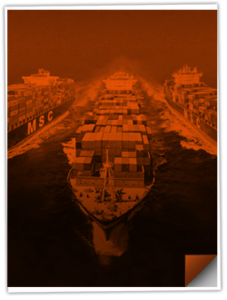Featured Headlines:
APHIS Phytosanitary Temporarily Marches On
CBP Still Treasures CBMA For Now
AGOA Tells Ethiopia Mali And Guinea To Go Away
Covid Belabors The Labor Shortage
Nor’Easter Could Knock Us On Our Keister
Zero Chance Of Covid Zero Policy Change
Cathay Pacific Cargo Suspends JFK Freighter For 3 Months
APHIS Phytosanitary Temporarily Marches On
- APHIS announced it will not reject copies of phytosanitary certificates beginning December 31, 2021 as expected.
- Instead, it will give importers until March 31st to implement the change.
- Click here to view the official bulletin.
CBP Still Treasures CBMA For Now
- In December, US Customs and Border Protection (CBP) issued instructions via CSMS #50484790 for filing for reduced tax rates and/or credits on imported alcoholic drinks under the Craft Beverage Modernization Act (CBMA), which was extended permanently at the beginning of 2021.
- While CBP will continue to oversee the provisions for now, it said that the Treasury Department will take over in 2023.
AGOA Tells Ethiopia Mali And Guinea To Go Away
- Effective January 1st, the US terminated Ethiopia, Mali and Guinea from the African Growth and Opportunity Act (AGOA) trade preference program due to actions taken by each of their governments in violation of the AGOA Statute.
- The official announcement cited alleged human rights violations by the Government of Ethiopia and recent coups in Guinea and Mali were responsible for the decision.
- At present, 36 nations of sub-Saharan Africa are now eligible to participate in the duty-free trade program.
Covid Belabors The Labor Shortage
- CSX Railroad and The Ports of Los Angeles and Long Beach have reported an increase in staff sick days and have warned the shipping public to brace for labor disruptions as Omicron sweeps across the country.
- Warehouses nationwide, including Amazon fulfillment centers, are reinstating mask requirements and other safety measures; there is increasing pressure to allow for contact-free and paperless pickups and deliveries.
- COVID concerns and increased freight demand have heightened the need for truck drivers, and many trucking firms continue to increase pay packages to mitigate the industry’s capacity shortages.
- It is estimated that trucking wages have increased as much as 40% since COVID struck, with average FTL wages cresting above $90,000.
Nor’Easter Could Knock Us On Our Keister
- After a snowstorm on January 3rd left truckers and motorists stranded in Virginia on I-95 for 24 hours, another storm is headed for the ports of Baltimore, New York, and Boston on January 6th and 7th.
- The storm is not expected to bring more than 6 inches of snow, but high winds may well create safety concerns and delays on highways and at ports, airports, and rail ramps.
- America’s busiest domestic corridors include I-81 from Tennessee to Harrisburg, PA and I-95 from Baltimore to Elizabeth, NJ.
- The Port of Baltimore has already announced it will open Saturday to help catch-up.
Chinese New Fears
- Chinese New Year (CNY) occurs on February 1 in 2022. This event is typically the cause of the greatest human migration on the planet each year with literally billions of trips across China and greater Asia; migrant factory workers typically return home for up to a month while office workers usually have a shorter holiday.
- This year, the government is discouraging such travel in the interest of avoiding a COVID-19 surge and has cancelled many large-scale celebrations.
- As a result, many factories may remain open while continuing their manufacturing operations; however, a lack of available trucking capacity will greatly diminish overall export volumes for the first weeks of February.
Pakistan Losing Their Shirts
- A textile trade association estimates that Pakistan lost 20% of their essential textile export market in December after nationwide natural gas shortages caused mills in Punjab to close for 15 days.
- Textiles account for 60% of Pakistan’s exports by value, and the industry is crucial to their economy.
Zero Chance Of Covid Zero Policy Change
- Goldman Sachs expects China’s Covid Zero policy to persist at least through all of 2022; the Olympic Games in February is the most obvious reason Goldman expects little change in direction from Beijing.
- Concerns over the efficacy of the Sinovac vaccine in fighting Omicron will also motivate the Chinese government to use lockdowns, quarantines, and border closings as their chief weapons against the virus.
- On the political front, the 20th Communist Party Congress (a once every five-year event) is scheduled in 2022; President Xi Jinping is expected to win an unprecedented third term at the event, and observers expect China to do everything possible to ensure a safe and timely Party Congress.
Playing Peek-A-Boo With Peak?
- The National Retail Federation (NRF) has forecasted a 9% year-over-year increase in containerized imports in January and a 7% increase in February.
- Interestingly, the same forecast indicates a 3.3% slippage in March 2022. For an industry almost desperate to see evidence of a diminishing cargo surge, the bad news is that March of 2021 was the busiest import month in US history with 2.5M TEUs.
- March 2021 was 55.7% more active than March 2020 and had 39.6% more arrivals than March 2019; it feels obvious that a mere 3.3% decline will not be enough to greatly reduce the chronic congestion plaguing the US transportation system.
Ningbo Lockdown Countdown
- The Beilun district of Ningbo is on lockdown after a COVID-19 outbreak; this area is home to many container depots, factories and warehouses—especially in the garment business.
- For cargo outside Beilun, but closer to greater Ningbo, the first major disruption is trucking capacity; truck drivers face lengthy delays at all borders for testing and potential quarantine.
- Any trucker who enters the lockdown area is not permitted to leave though the local government is working on a permit system to allow truckers to pass through the affected area; as of today, only 20% of trucker have been permitted.
- The Zhejiang government’s plan—informed greatly by the 2-week terminal closing in 2021—includes police-controlled trucking routes, requirements for truckers to remain in their vehicles while on-port, and strict health checks of vessel crews. The government expects to establish a control system for each container terminal to best manage the implementation of all safety measures.
- With 192 vessels currenting at berth, at drift, or at anchor in Ningbo and Shanghai, the stakes are very high for an industry searching for “smooth sailing” for long enough to get vessels, containers, and chassis where they need to be globally.
Cathay Pacific Cargo Suspends JFK Freighter For 3 Months
- In late December, Cathay Pacific airlines quarantine requirements for crew went from a mandatory hotel confinement of 3 days to 7 days, after citing a case where a cockpit crew member tested positive for COVID 5 days after arrival.
- In the same timeframe, the Hong Kong SAR Government banned more international routes due to increased COVID-19 cases, which primarily affects flights to and from the US, Canada, UK, France, Australia, Philippines, Pakistan, and India.
- Due to the increased quarantine time and border closures, Cathay Pacific suspended all long-haul cargo flights through January 6th to give time for closed loop scheduling and extended hotel accommodations for crew.
- On January 6th, the Hong Kong flag carrier announced substantially reduced capacity through the first quarter of 2022; the space crunch is reported to be two-thirds of their cargo capacity and 80% of their passenger flight potential scope.
- JFK has lost all Cathay Pacific Hong Kong freighter flights for the next three months; Cathay suspended all EU freighters as well for the first quarter.
- System flight adjustments are forthcoming.



